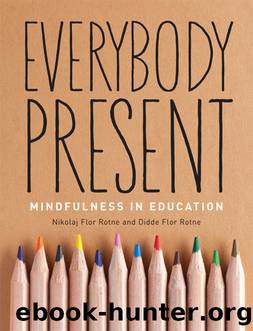Everybody Present by Flor Rotne Nikolaj;Flor Rotne Didde;

Author:Flor Rotne, Nikolaj;Flor Rotne, Didde; [Rotne, Nikolaj Flor; Rotne, Didde Flor]
Language: eng
Format: epub
Publisher: Parallax Press
Defense Mechanisms
As teachers, we can have difficulty accepting the fact that we play a part in our studentsâ poor development or lack of learning. We have observed many times that a parent who contacts her childâs teacher because the child isnât thriving at school is rebuffed or met with blame. When the teacher either denies that there are problems with the childâs growth or lays the responsibility on the parent, itâs difficult for them to work constructively together. The teacherâs defense mechanisms block his willingness to have an open mind about the situation and take his share of the responsibility in solving the problem.
Weâre all guided by psychic defense mechanisms that we use to reduce or banish experiences of strong, unpleasant feelings. Examples of psychic defense mechanisms include denial, projection, intellectualizing, idealizing, and splitting.
In situations where we allow ourselves to be attacked by anotherâs negativity, denial is an obvious psychic mechanism to use in self-defense. With denial we shut our eyes to the situation and pretend that the attack hasnât found its target.
We can also use idealizing, in which we see only the good in every situation, repress the bad, and pretend that everything is fine.
Projection implies that we transfer an inner conflict on to someone else; a mechanism we often use if weâre stressed. We get rid of the difficult feelings by projecting them out into the environment. For instance, we might blame the parents of a girl we find difficult to control in class for not having brought up their daughter properly, even though thatâs only one part of the story.
The defense mechanism of splitting means that we canât handle ambivalence, and so we divide the world into black and white. Through splitting, we try to gain control over a situation we experience with growing anxiety.
Our psychic defense mechanisms are hard at work distancing us from those things that are hard to look in the eye, from breakdowns in relationships to experiences that create feelings of inadequacy. Through mindfulness it becomes possible to create other methods of coping with difficult situations so that we avoid dependence on defense mechanisms. In that way we can change our inappropriate habits. As the following story shows, we have to work to get rid of our inappropriate defense mechanisms.
The Princess and the Dragon
Once upon a time, a king and queen found themselves in debt to a dragon. To relieve themselves of this debt, they entered into a bargain to marry their daughter, the princess, to the dragon. The princess was very unhappy about this bargain and went to a wise woman to seek advice. The wise woman told her she should not complain, but simply follow her instructions. When the wedding day dawned, the princess followed the old womanâs advice and put on ten thin dresses. On the wedding night, the princess asked the dragon if heâd remove his clothes at the same time she did, so she wouldnât be too embarrassed. The dragon agreed to the bargain. Each time the princess took off a layer of clothing, the dragon had to take off a layer.
Download
This site does not store any files on its server. We only index and link to content provided by other sites. Please contact the content providers to delete copyright contents if any and email us, we'll remove relevant links or contents immediately.
Chicken Soup for the Soul Presents Teens Talkin' Faith by Jack Canfield(777)
Understanding PDA Autism in Kids: A Guide for Parents and Teachers to Support Neurodiverse Learners by Jehu Len(565)
The Victorian Era: A Captivating Guide to the Life of Queen Victoria and an Era in the History of the United Kingdom Known for Its Hierarchy-Based Social Order by Captivating History(439)
Brain Teasers to Build Critical Thinking Skills by Safarova Kris(419)
Brain Teasers to Build Critical Thinking Skills: Brain Exercises for Tech, Banking, Case Interview Prep, and to Keep Your Mind Sharp by Kris Safarova(419)
100 Ideas for Secondary Teachers: Engaging Parents by Janet Goodall & Kathryn Weston(392)
Python 101 - Fundamentals by Sam(377)
Critical Curriculum Leadership : A Framework for Progressive Education by Rose M. Ylimaki(369)
Writing Solid Code: Development Philosophies for Writing Bug-Free Programs by Steve Maguire(363)
The Art of Emotional Validation: Improve Your Communication Skills and Transform Your Relationships by Validating Emotions and Feelings by Emily Wright(340)
Intersectionality in Educational Research by Dannielle Joy Davis; James L. Olive; Rachelle J. Brunn-Bevel; Susan R. Jones(338)
The Knights Templar: An Enthralling History of the Rise and Fall of the Most Influential Catholic Military Order by Wellman Billy(335)
A Beginner's Guide to SSD Firmware by Unknown(330)
The Future Knowledge Compendium by Ellyard Peter;(322)
How to be assertive in any situation by Hadfield Sue & Hasson Gill(317)
What Every Teacher Should Know about Learning, Memory, and the Brain by Tileston Donna E. Walker;(311)
Making Connections in and Through Arts-Based Educational Research by Hala Mreiwed Mindy R. Carter Sara Hashem Candace H. Blake-Amarante(310)
Foundations of Educational Research by Victoria Elliott(309)
Message from the Pleiades; The Contact Notes of Eduard Billy Meier v1 only by unknow(306)
